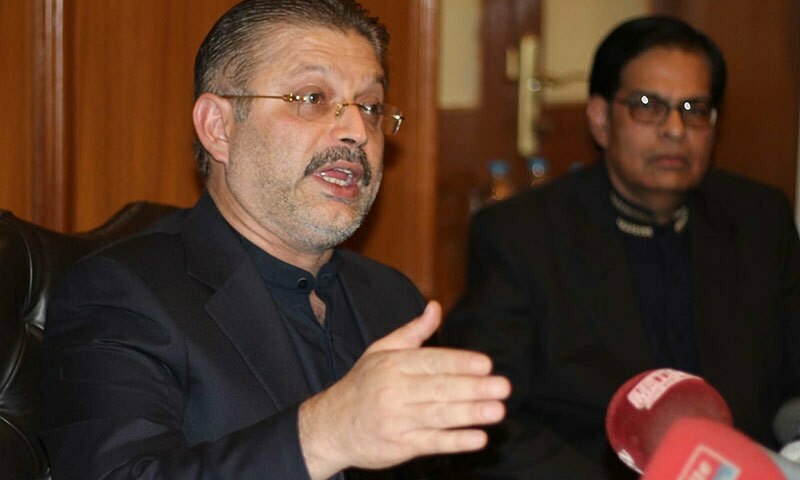HYDERABAD: An elderly farmer, Hafiz Aziz Soomro, lost his patience and his voice trembled in anger as he shared his ordeal. “They [irrigation officers] are so scared of influential landlords that they continue to supply water to their [unauthorised] fishponds despite the worst water shortage persisting in the province. I and my fellow farmers are left to seek divine help to get our share in water,” he said.
Hafiz, a farmer owning 35 acres of land, showed this reporter how water of Pinyari Canal was being diverted to a saline water drain in Sujawal district to supply water to powerful personalities’ unauthorised fishponds.
His fellow farmer, Ghani Soomro, agreed with him. “While I and other farmers are not getting water to sow rice crop, the influential persons get water flows without break for their fishponds,” said Ghani pointing to the saline water drain — sim nullah in local parlance — on Bathoro-Sujawal road which was getting Daro branch’s water through Qazi minor and Pathan Wah near Badin road.
Daro branch is fed through non-perennial Pinyari Canal of Kotri Barrage. Pinyari receives water allocation for six months for rice sowing. “We can show this to irrigation officers as well,” said Ghani.
Small growers blame nexus between influential figures and irrigation officials for their woes
Hafiz chipped in to say: “A cut is given to sim nullah to divert water to fishponds”. The euphemistic terms like ‘powerful’ and ‘influential’ refer to Malkanis, Soomros, Sheerazis and Legharis — all associated with ruling Pakistan Peoples Party. Unauthorised fishponds receive plenty of irrigation water even during the worst province-wide water shortage.
Mohammad Ali Malkani, a former minister and sitting MPA, MPA Shah Hussain Shah Sheerazi and Ms Rehana Leghari, incumbent deputy speaker of Sindh Assembly, are from Sujawal. But they all outright deny owning fishponds. “I own farmlands but not fishponds. We face worst shortage. How can I get water for fishponds?”, came curt reply of Ms Leghari.
Mr Malkani, likewise, has this to offer. “I had fishponds in my constituency of Jati and Shah Bandar but those ponds are lying barren now. We don’t have water to drink, what to talk of owning fishponds. These ponds do exist in other areas of my district”, remarks the MPA. Shirazis also perhaps don’t own any.
No shortage for elite’s lands
It was noticed during a visit to different parts of Sujawal that not only fishponds on Bello-Daro and Sujawal-Dao roads, but even farmlands of influential persons were also receiving plenty of water while long patches of land, owned by lesser known small farmers, were lying dry although prepared for cultivation of rice crop.
Small farmers are asked by irrigation staff to wait until flows improve in Indus river.
The unabated water supplies to the fishponds is just mind-boggling at a time when Sindh Minister for Irrigation Jam Khan Shoro told journalists at a press conference the other day in Karachi that “Kotri Barrage is not in a position to ensure water for drinking purposes”.
The misuse of available water flows within certain barrages’ command areas exacerbates already persisting water scarcity.
United Nations’ Global Land Outlook report has listed Pakistan among 23 countries which faced ‘drought emergencies’ in the 2020-2022 period.
Fishponds’ owners do not pay taxes
“You can build fishponds of whatever size you want and you don’t need to pay any tax as government is promoting aquaculture,” said Fisheries director general Mir Allah Dad Talpur. He, however, said that agriculture-wise productive land could be used for fishponds. “There are 3,434 fishponds across Sindh,” he said.
According to a retired officer of fisheries, Sindh Fisheries Rules 1983 do not apply to ponds. “They can be built anywhere and of any size,” he said.
Kotri Barrage Chief Engineer Haji Khan Jamali conceded that 95pc fishponds in Thatta and Sujawal were unauthorised. “Landowners divert water sanctioned for their farmland to ponds which is illegal. But it is a common practice in Kotri Barrage’s command area. These days, action is being taken against them,” he said.
He said that fishponds that were located close to main canals or branches might be having plenty of water flows but not in all cases. “When water is in surplus nobody asks for action but in conditions like this when everyone is crying for water, action is certainly taken,” he said. “Irrigation Act 1897 is being amended to penalise misuse of irrigation water,” he said.
Sindh Abadgar Board vice president Mahmood Nawaz Shah considers it a serious anomaly. “It needs to be curbed,” he said. He added that when the system had only one fourth of water and the same was diverted to fishponds at the cost of farmers’ share it was blatant injustice.
His colleague, a seasoned grower from Sujawal, Nadeem Shah, believes: “A fishpond on 100 acres gets water equivalent to needs of 2,000 acres of farmland which means the owner should pay 100 times more abiyana recovered by revenue department. But that is not the case,” he said. He pointed out that water flows for fishponds were mostly not sanctioned either.
Ordinary growers helpless
Among Sindh’s three barrages with 14 main canals, Kotri Barrage’s canals feed tail areas like Sujawal, Badin and Thatta. The three districts are also the ones which are worst-hit by sea intrusion.
Hafiz Aziz remarked that the mighty persons could do everything because irrigation officers were bound to appease them.
“Our cries for water fall on deaf ears and we aren’t usually able to grow even a single crop of rice in Kharif season on time. It is our just right but we are destined to wait either for water flows to improve suddenly or rains to come to our rescue,” he said.
Published in Dawn, May 29th, 2022















































